|
SURFERS
AGAINST SEWAGE
ABOUT -
CLIMATE
CHANGE - CONTACTS - FOUNDATION -
HOME - OCEAN
PLASTIC
PLEASE
USE OUR A-Z INDEX
TO NAVIGATE THIS SITE
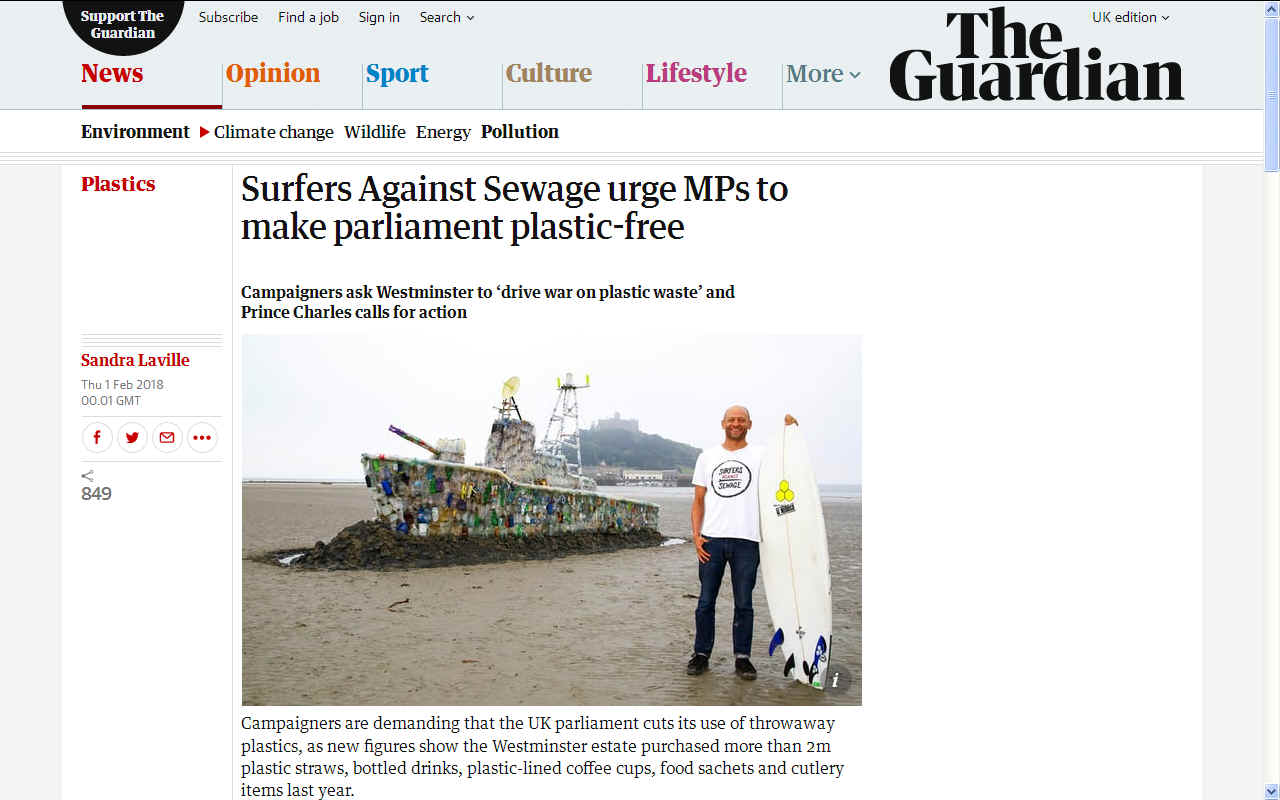
PARLIAMENT:
Taking the lead in reducing plastic waste would be a good
thing for the United Kingdom Houses of Parliament. Start as
you mean to go on, or admit that you could not give a fig.
Either way the public who are opposed to marine litter will be
able to gauge what the political mood is. The picture is of Hugo
Tagholm (Surfers Against Sewage) with a model ship made of plastic marine litter.
Nice one Hugo.
Surfers Against Sewage (SAS) is a marine conservation charity working with communities to protect oceans, waves, beaches and marine life. It was created in 1990 by a group of Cornish surfers from the villages of St Agnes and Porthtowan on the north coast of Cornwall.
Set up as a single-issue campaign group in 1990, Surfers Against Sewage led a nationwide campaign for improved water quality. Their campaign's success was helped by the
privatization of English water companies in the late 1980s and key pieces of EU legislation including the Bathing Water Directive.
In 2012, Surfers Against Sewage was recognised as a national marine conservation charity focused on the protection of waves, oceans, beaches, marine wildlife and coastal communities.
Campaigns
Today the organisation represents an ever-expanding supporter base and campaigns on a diverse range of issues. SAS campaigns for both the UK’s coastal environment and the health of all surfers and other recreational waters users. Recently, SAS has expanded its remit into the protection of the wave resource and surfing spots through the Protect Our Waves (POW) campaign. Since 1990, SAS has secured a multitude of campaign successes on behalf of all water users.
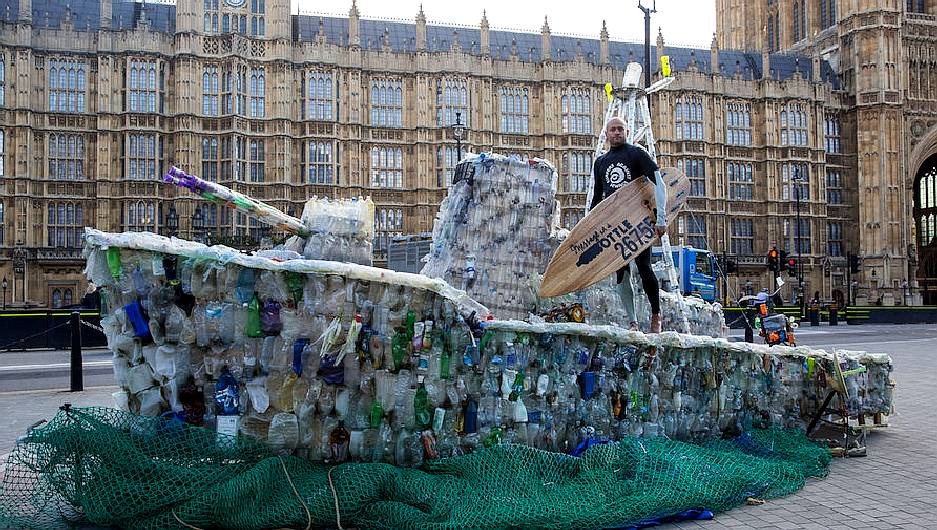
Plastic Free Coastlines
More recently, Surfers Against Sewage have turned their attention to battling the new sewage - plastic pollution. Through national initiatives such as the Big Spring Beach Clean and the Autumn Beach Clean Series they hope to empower communities to protect their coastlines. Further up in the chain of events, SAS are using their Waves All-Party Parliamentary Group (APPG) to encourage politicians to explore and introduce policies to prevent plastic emissions from entering the environment.
Protect Our Waves
SAS launched the Protect Our Waves campaign to increase public awareness to the importance of waves in the socioeconomic fabric of many UK coastal communities. Behind the scenes SAS has been consistently representing surfers and waveriders on rights of access, and ensuring the wave resource is recognised and valued.

THE GUARDIAN 1 FEBRUARY 2018 - SURFERS AGAINST SEWAGE - PLASTIC
FREE PARLIAMENT
Campaigners are demanding that the UK parliament cuts its use of throwaway plastics, as new figures show the Westminster estate purchased more than 2m plastic straws, bottled drinks, plastic-lined coffee cups, food sachets and cutlery items last year.
Freedom of information requests submitted by Surfers Against Sewage show that hundreds of thousands of items of plastic cutlery, more than a million takeaway coffee cups and nearly 22,000 plastic straws were used last year in the Commons and Lords.
The figures were revealed as the Prince of Wales was set to give a
speech describing the scale of plastic pollution of the ocean as a “nightmare” which was “set to get worse rather than better”.
The prince will call for local, national and global action to stop the flow of plastic into the seas. He will call on leading business figures, supermarkets, raw materials manufacturers, drinks companies and policymakers to cooperate to make their plastics more recyclable, reduce plastic production and recover as much plastic as possible from the world’s oceans.
Launching their campaign to make the UK parliament plastic-free Surfers Against Sewage called on individuals to lobby their MPs to reduce the throwaway
plastic footprint of the House of Commons and House of Lords.
Kerry McCarthy, a Labour MP, supported the campaign. “Pressure is rightly growing on all of us to take action to reduce our plastic footprint,” she said. “It is time for parliament to not only get its own house in order but take a lead on ambitious action to end its use of throwaway plastic.”
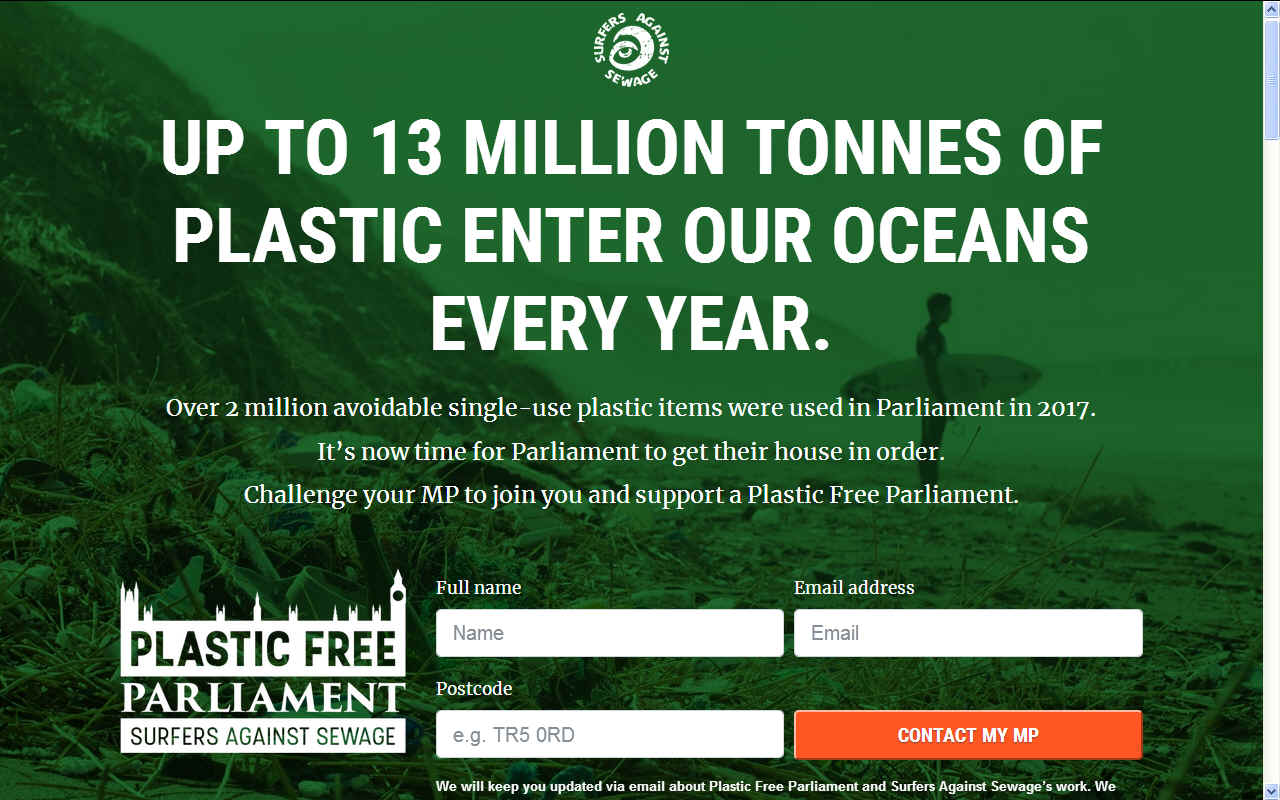
Hugo Tagholm, of Surfers Against Sewage, said parliament had taken some steps to reduce throwaway plastic, but more could be done. He called for MPs to make personal pledges to stop using plastic water bottles and to use refillables instead. He is calling on parliament to increase water fountains throughout the buildings.
“The engine to drive the war on plastic waste is in the Palace of Westminster, where our elected politicians can pass progressive new legislation to decouple society from its addiction to avoidable, single-use, plastics,” he said. “They must also set an example in refusing avoidable plastics, and send a strong message to the world from a plastic-free parliament.”
This month the prime minister focused attention on reducing the use of throwaway plastic as she launched a 25-year environmental plan.
Tagholm has written to the Speaker of the Commons to ask if parliament can lead by example and take ambitious action to tackle the global problem.
Steve Double, the Conservative MP for St Austell and Newquay, said the coastlines of his constituency were all under threat by the marine menace of waste plastic. “MPs ... have our own role to play in raising awareness and setting an example on this important matter,” he said.
At least 8m tonnes of plastic leak into the oceans each year and are now reaching into the furthest depths of the seas.
On Thursday, at a meeting in London of business leaders, supermarket sustainability chiefs, policymakers and environmentalists,
Prince Charles was due to say that the challenge to keep plastic out of the ocean was “grave and unbelievably urgent”. He was expected to welcome the fact that plastic waste was now on the global agenda and in the public consciousness, and to call for an integrated approach by processors, manufacturers, designers, consumers, retailers, distributors, waste management bodies and policymakers.
By Sandra
Laville
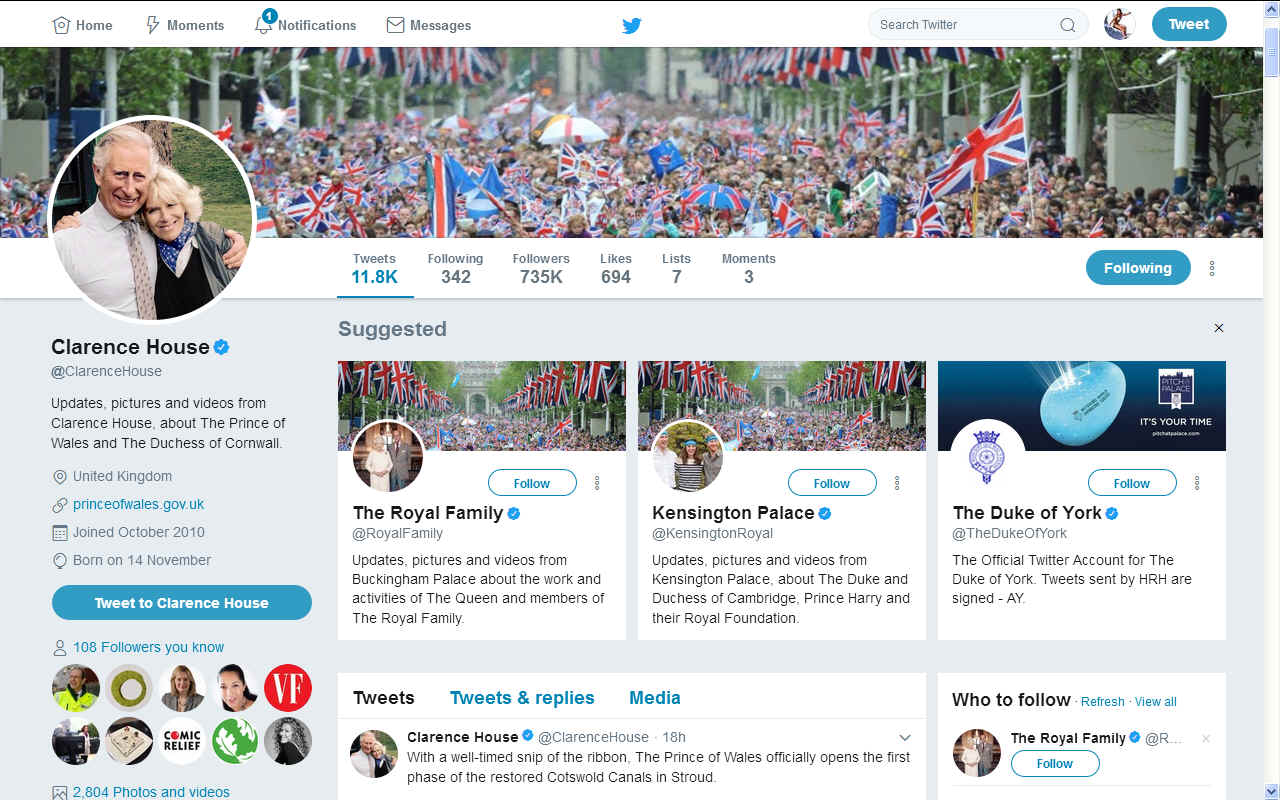
PRINCE
CHARLES: Has long been a supporter of the cleaner oceans
cause, speaking at various events about the problem. HRH was
in the Royal Navy of course and there is a strong Naval
tradition in the United Kingdom, despite the fact that war as
a concept is fading fast in the new world of global
communications, drones and robotics.
STEVE
DOUBLE MP FEBRUARY 2018
Next week on 6th February, in my capacity of Chairman of the Protect our Waves All Party Parliamentary Group, working with
Sky TV, I am hosting an event calling on MPs to pledge to cut the amount of plastic used in Parliament with the aim of making the UK the first plastic free Parliament.
In the Cornish constituency of St Austell and Newquay which I am proud to represent, we have many miles of stunning coastline, beautiful beaches and amazing seascapes. People come from all over the world to enjoy our wonderful natural environment. Interspersed with all of this is all too obvious marine menace – the plastic foe that has invaded our waters.
Since my election in 2015 I have chaired the Protect Our Waves APPG and along with the renowned campaigners at Cornish charity Surfers Against Sewage have worked hard to highlight the problems we are storing up for ours and future generations with our reckless use of
single use
plastics.
In 1950, the world’s population of 2.5 billion produced 1.5 million tons of plastic; in 2016, a global population of more than 7 billion people produced over 320 million tons of plastic. This is set to double by 2034. Every day approximately 8 million pieces of plastic pollution find their way into our oceans and there may now be around 5.25 trillion macro and microplastic pieces floating in the open ocean, altogether weighing up to 269,000 tonnes.
UK-wise, approximately 5000 items of marine plastic pollution have been found per mile of beach and on average over 150 plastic bottles can be found on each mile of UK beaches.
On top of this, recent studies have revealed marine plastic pollution in 100% of marine
turtles, 59% of whales, 36% of seals and 40% of seabird species examined. 100,000 marine mammals and turtles and 1 million sea birds are killed by marine plastic pollution annually.
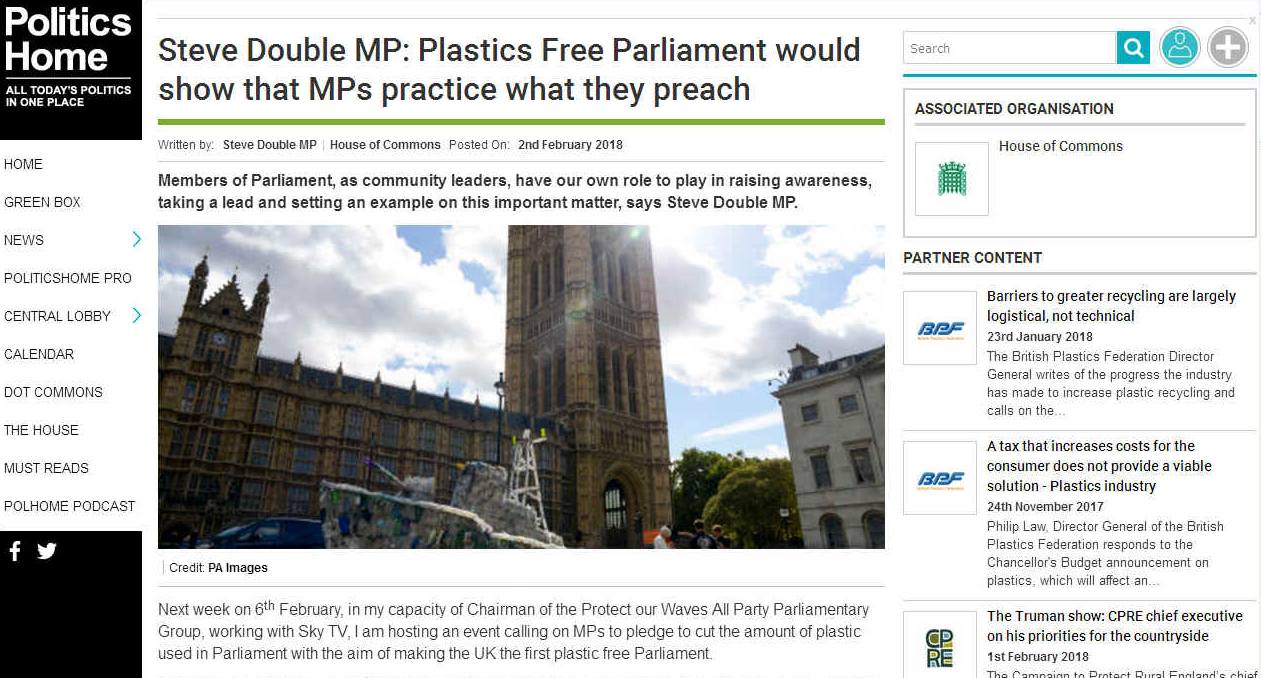
These shocking facts were highlighted by the recent
BBC Blue Planet as well as being brought to the public’s attention by other campaigns such as the Sky News Ocean Rescue.
Recently, and in the last year in particular, this Government has taken steps to reduce the amount of plastics we use and waste. There is the plastic bag charge, that was just extended in the recent Budget that has caused nine
billion fewer bags to be used since its introduction in 2015, as well as generating more than £66m given by
supermarkets to good causes from the income generated by the charge.
The Government has recently brought in the ban on microbeads in cosmetic products that were putting hundreds of thousands of tiny pieces of plastic into our drains every time we showered.
There is also the campaign to bring in a deposit scheme for single use plastic bottles, and the recent announcement by the PM as part of the 25 Year Environment Plan that the Government will be working with retailers to introduce plastic-free supermarket aisles – a great move to cut down on some of the frankly ridiculous amounts of plastic packaging we get on food purchases such as fruit and vegetables.
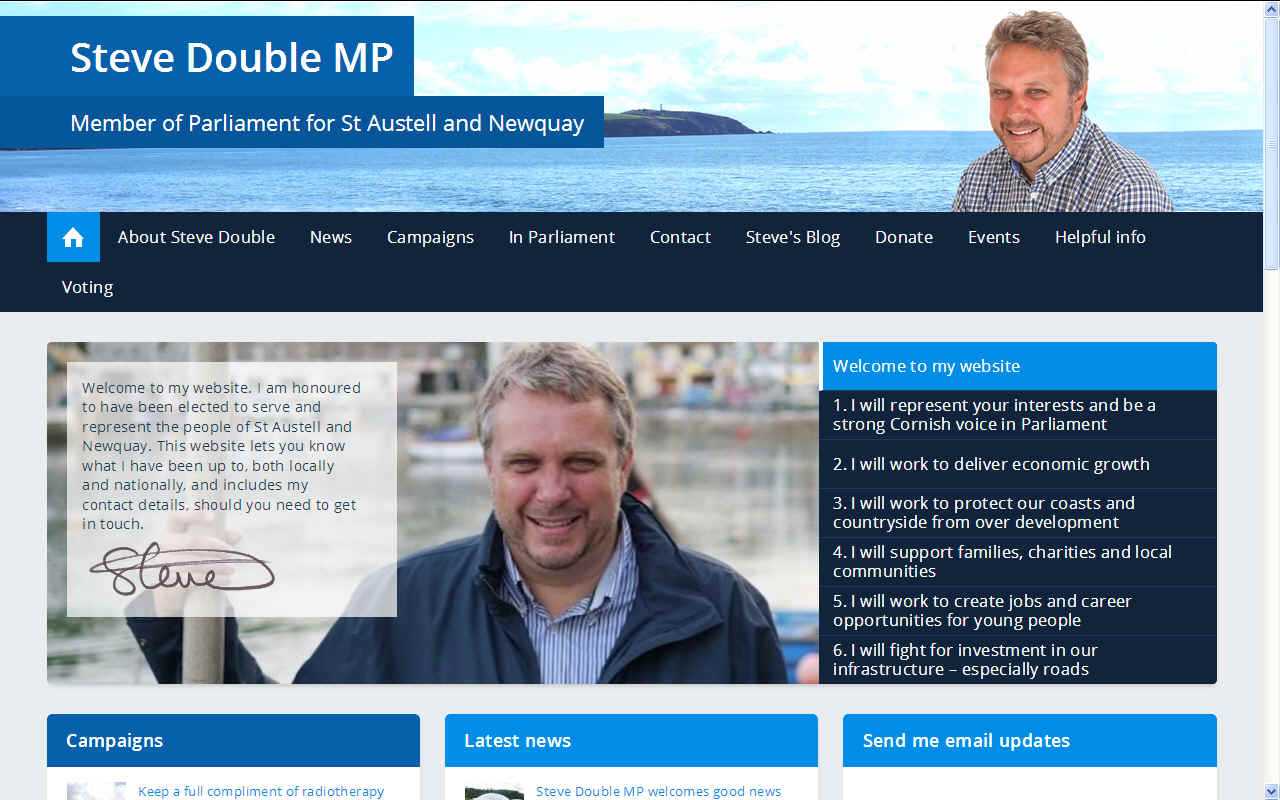
These are all great initiatives and along with this, public awareness of the plastic waste problem has never been higher. There are plenty of grass-roots movements starting to look at how we as communities can address the problem. Several originate in
Cornwall, including the Refill initiative, which sees businesses providing free
water to encourage less use of single use plastic bottles, the Final Straw group, which looks at eliminating plastic straws from our hospitality sector, and the Plastic Free town movement, which recently saw Penzance pledge to become the first plastic free town in the country.
Members of Parliament, as community leaders, have our own role to play in raising awareness, taking a lead and setting an example on this important matter. That is why I am pleased to be working with Sky and Surfers Against Sewage to bring forward the Plastic Free
Parliament Campaign. Specifically, this campaign is all about getting MPs to practise what many of us preach and sign up to reduce the amount of plastic we use in our offices. I am looking forward to the event and hope this will be another step the fight against plastic waste.
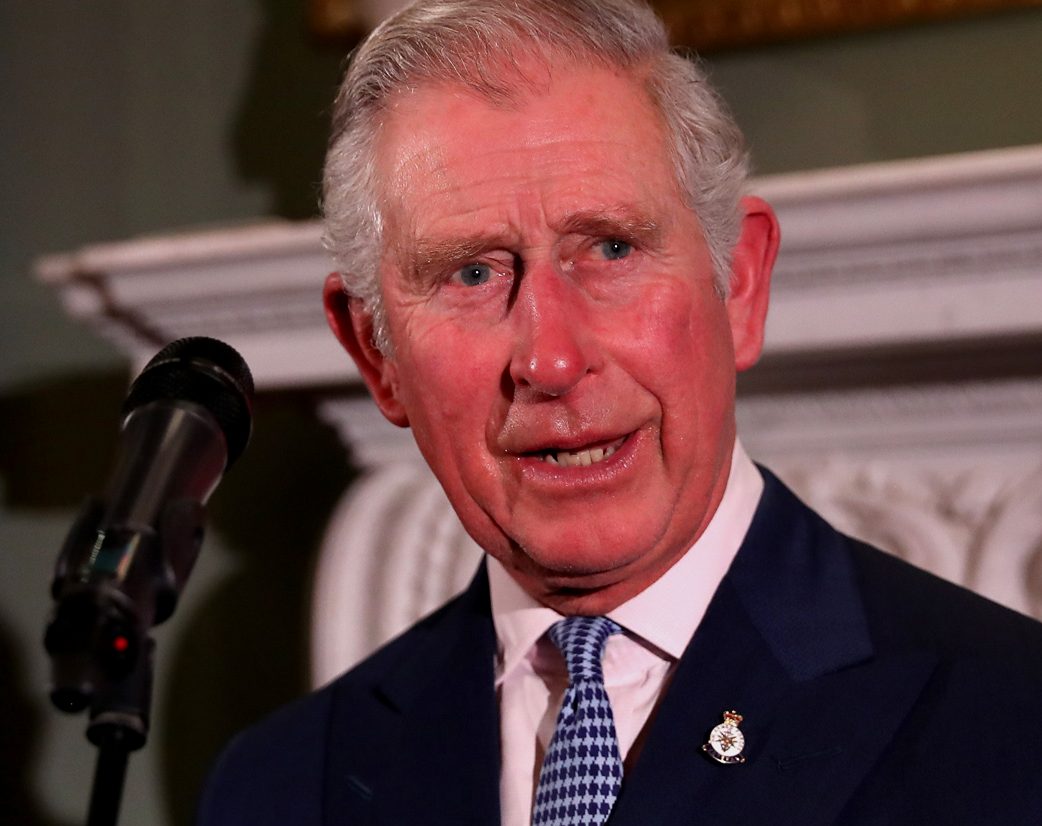
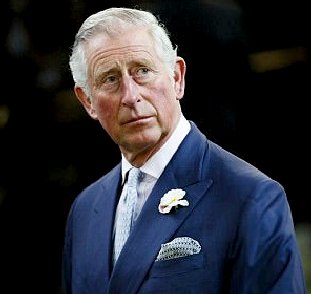
PRINCE
CHARLES: Conservationist Royal, the Prince of Wales has
long been outspoken on environmental issues, sometime taking a
lot of flak for his efforts. Well done on that your Highness.
HUFFINGTON
POST 1
FEBRUARY 2018
More than 1 million disposable coffee cups were purchased in Parliament last year, latest figures reveal, as campaigners urge politicians to ditch single-use plastic.
Despite Theresa May launching her 25-year plan in a bid to eradicate all avoidable plastic waste in the UK by 2042, large quantities of disposable plastic are still being purchased in
Parliament.
Plastic straws, coffee cups, condiment sachets, plastic cutlery and disposable plastic water bottles are among the items still widely-used.
In total, more than 2 million avoidable single-use plastic items were purchased by the House of Commons and the House of Lords in 2017.
Plastic cutlery was the second most-purchased item after coffee cups, with a total of 398,000 being bought in Parliament.
Soft drink bottles accounted for 200,584 of the single-use plastic items purchased, with 193,050 coming from the House of Commons.
Environmental campaigners have urged the prime minister to lead by example in the war on plastic.
Surfers Against Sewage (SAS), who obtained the figures through a Freedom of Information request, said that an immediate latte levy on disposable plastics could help reduce the number of products used.
SAS also urged MPs to bring in their own reusable cup to combat waste and have launched the Plastic Free Parliament campaign.
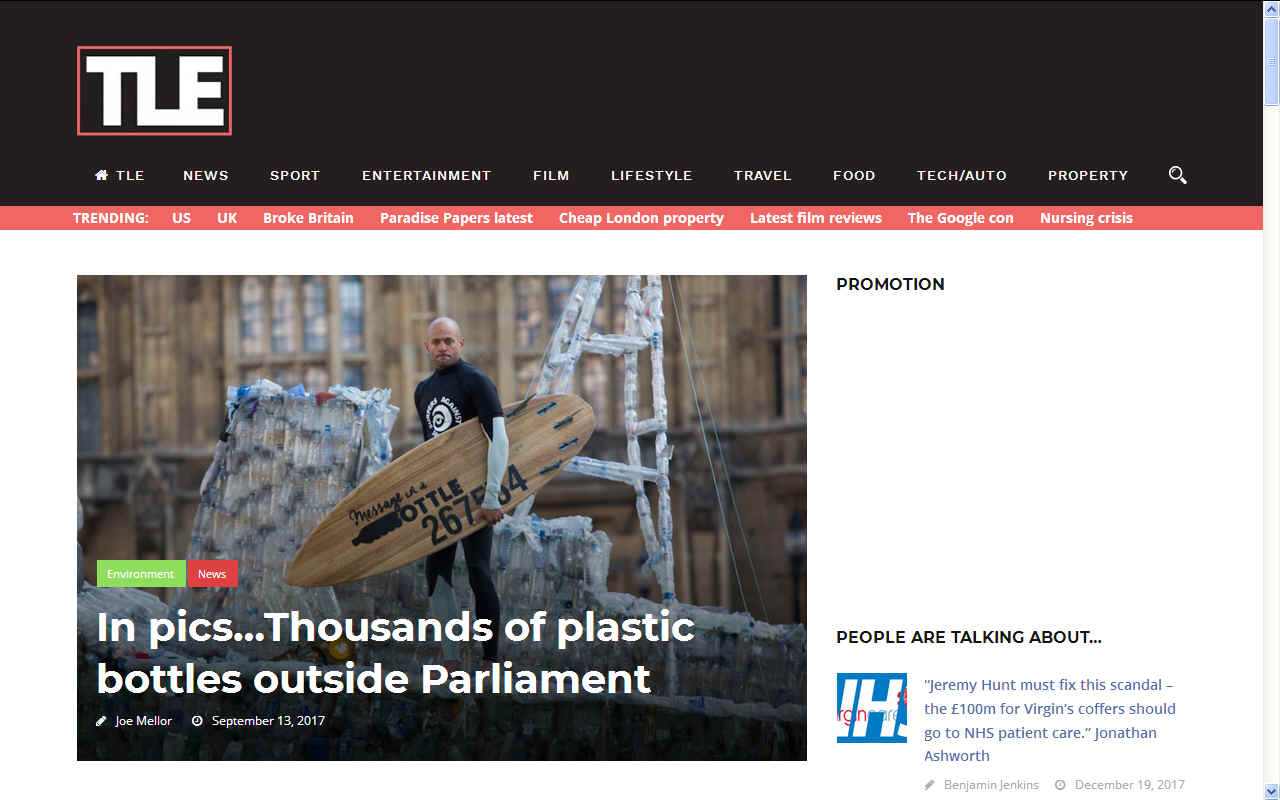
Hugo
Tagholm, CEO of Surfers Against Sewage said: “The engine to drive the war on plastic waste is in the Palace of Westminster where our elected politicians can pass progressive new legislation to decouple society from its addiction to avoidable, single-use plastics.
“They must also set an example in refusing avoidable plastics, and send a strong message to the world from a Plastic Free Parliament.
“We hope all Members of Parliament and Peers will join us to call for a phase out of throwaway plastics to get their Houses in order.”
Surfers Against Sewage has written to the speaker of the House of Commons to request that Parliament takes urgent action on plastic.
Conservative MP Steve Double said: “There are many steps we can take as consumers to reduce the amount of single use disposable plastics we use.
“Members of Parliament, as community and national leaders, have our own role to play in raising awareness and setting an example on this important matter.
“That is why I am pleased to be working with Surfers Against Sewage and others to bring forward the Plastic Free Parliament Campaign and reduce the amount of plastic that gets used and thrown away on the Parliamentary estate.”
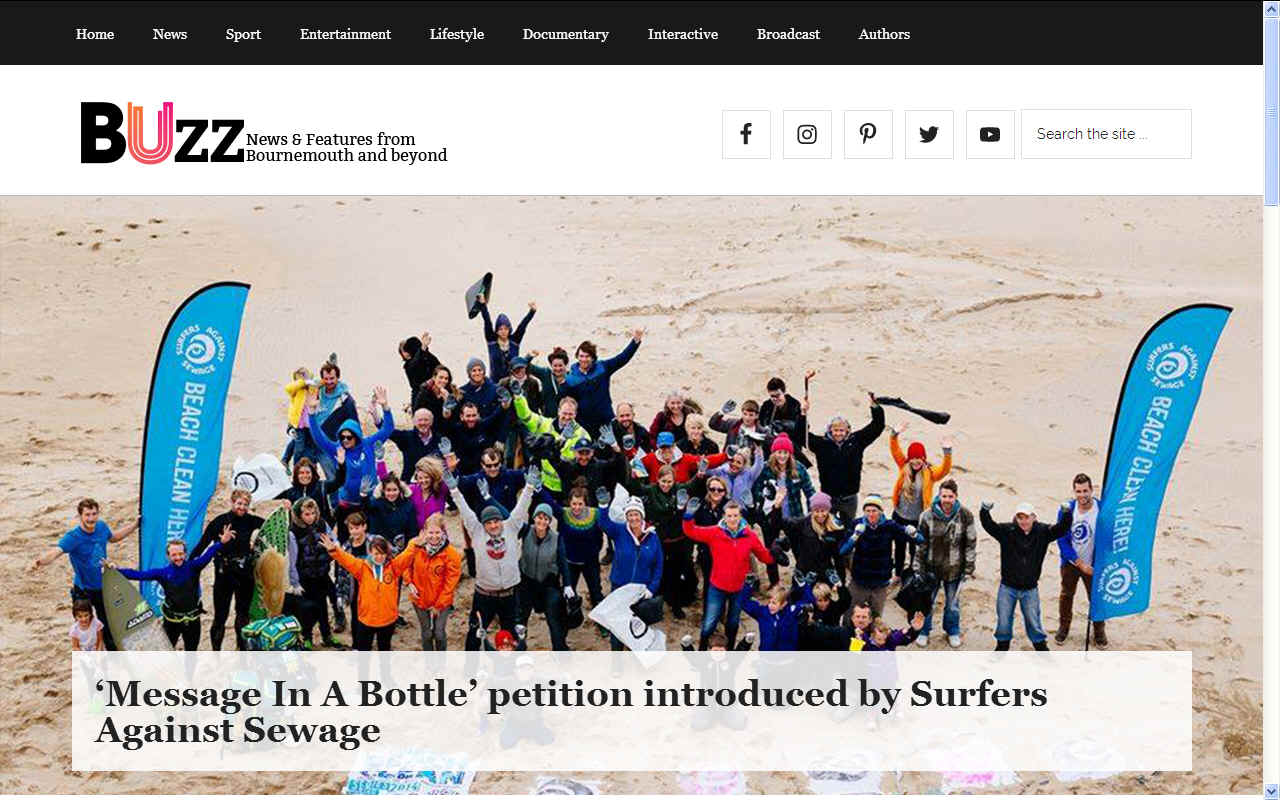
Labour
MP
Kerry McCarthy added: “The recent series of Blue Planet II has brought to public attention the serious damage plastic is causing to our marine life and habitats.
“Pressure is rightly growing on all of us to take action to reduce our plastic footprint.
“It is time for Parliament to not only get its own house in order, but take a lead on ambitious action to end its use of throwaway plastic”.
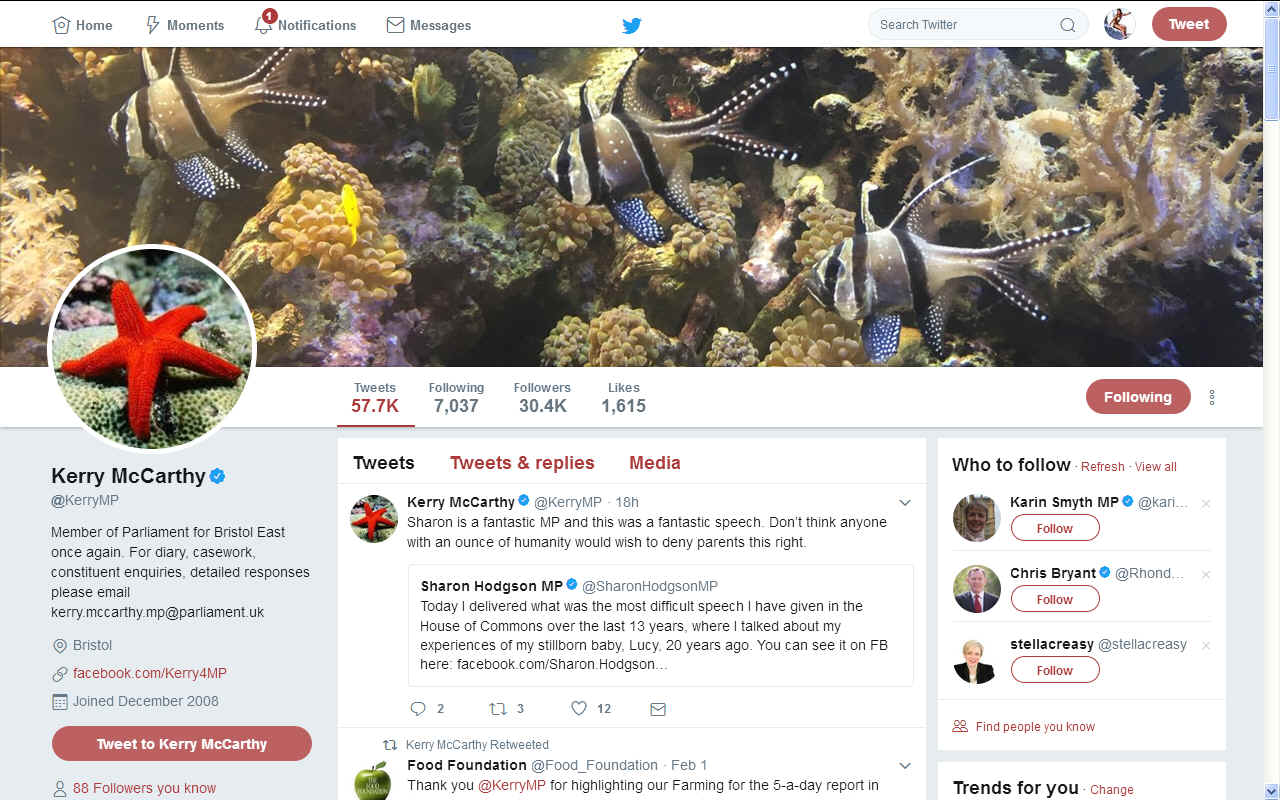
A House of Commons spokesperson said: “The House of Commons is committed to reducing the amount of waste across the parliamentary estate including plastic and operate a mixed recycling scheme to ensure as much as possible of our waste is recycled.”
A House of Lords spokesperson said: “Our catering and retail service is already taking steps to reduce the number of disposable plastic products it uses. It is currently reviewing which suppliers offer the most ethical and cost-effective disposable products (including straws). All hot beverage cups are made from recycled materials and it is encouraging customers to use their own cups by offering them a 10p discount.
“The catering and retail service gives preference to products that come from renewable sources and it was recently accredited by the Sustainable Restaurant Association. It will work with the association to implement innovative solutions for reducing the number of disposable products.”
SAS and campaign partners #OneLess are also calling on Parliament to review their water infrastructure and ensure free reliable water points are located within easy access locations throughout buildings to encourage refilling water bottles and reduce the need for single-use bottles.
Earlier this week it was revealed that councils are stockpiling rubbish after China banned importing plastic waste.
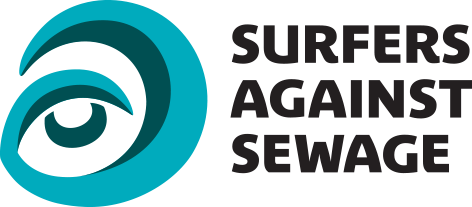
LINKS
& REFERENCE
https://en.wikipedia.org/wiki/Surfers_Against_Sewage
https://www.thelondoneconomic.com/news/pics-thousands-plastic-bottles-outside-parliament/13/09/
http://buzz.bournemouth.ac.uk/2017/10/message-bottle-petition-introduced-surfers-sewage/
http://www.huffingtonpost.co.uk/entry/plastic-parliament-surfers-against-sewage_uk_5a731826e4b0146e5944bde4
https://www.stevedouble.org.uk/about-steve-double
https://www.politicshome.com/news/uk/environment/opinion/house-commons/92527/steve-double-mp-plastics-free-parliament-would-show
http://buzz.bournemouth.ac.uk/2017/10/message-bottle-petition-introduced-surfers-sewage/
https://www.sas.org.uk/plastic-free-parliament/
https://www.theguardian.com/environment/2018/feb/01/surfers-against-sewage-urge-mps-to-make-parliament-plastic-free
https://twitter.com/ClarenceHouse/
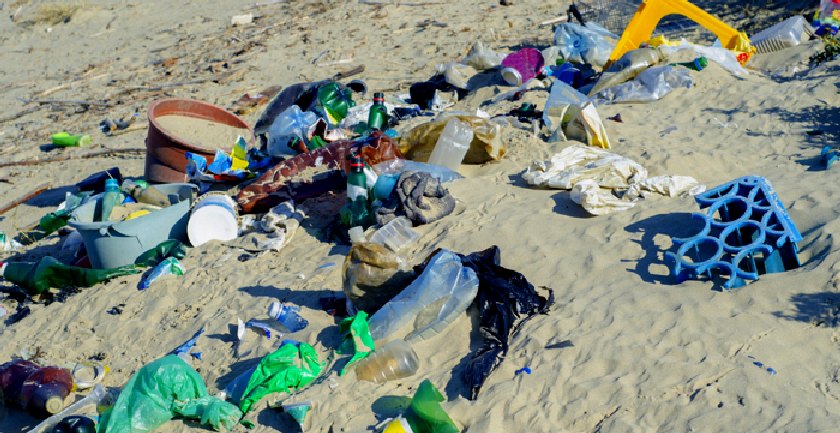
This
website is provided on a free basis as a public information
service. copyright © Cleaner
Oceans Foundation Ltd (COFL) (Company No: 4674774)
February 2018. Solar
Studios, BN271RF, United Kingdom.
COFL
is a charity without share capital.
|













